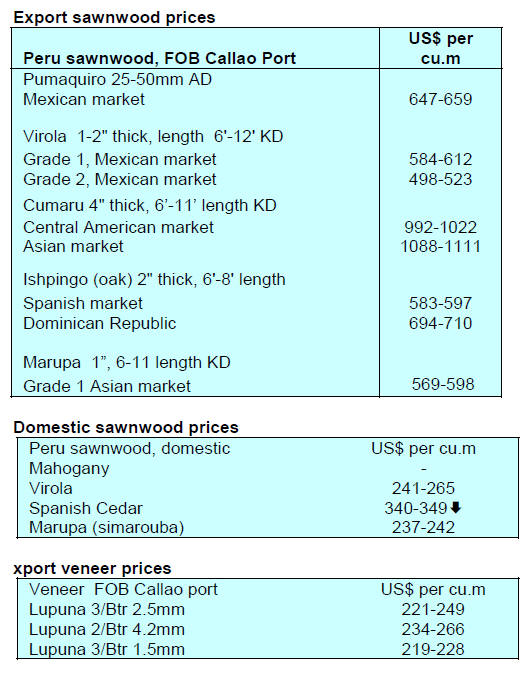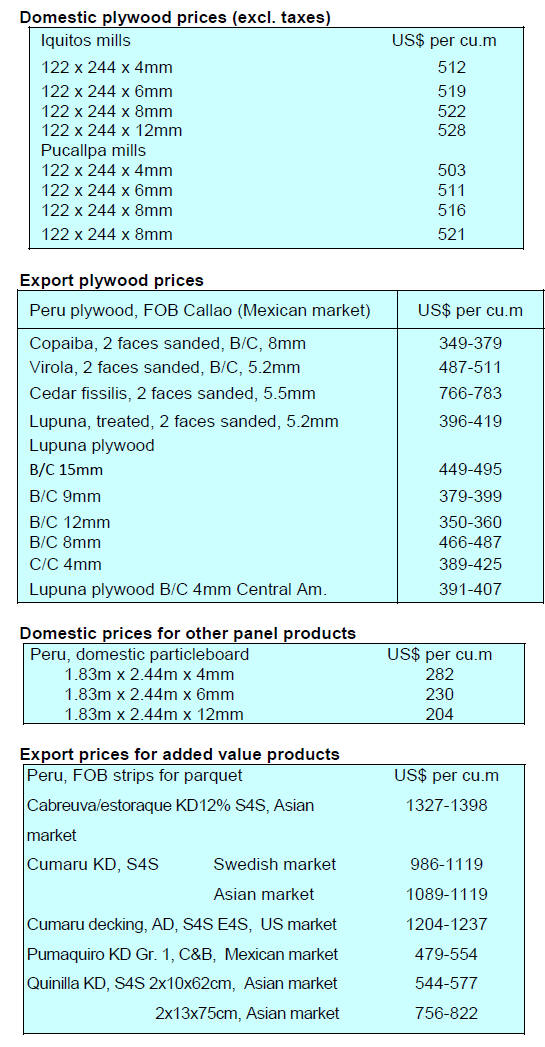Hajiji also reported that over 100,000 hectares of degraded
forests have been identified for restoration in Sabah and
the State government has budgeted RM26.6 million in the
12th Malaysia Plan for forest rehabilitation and
management.
4.
INDONESIA
Double-digit growth in timber
exports
Indonesia notched up the remarkable feat of achieving
double-digit growth from its forestry exports in the first
quarter of this year despite the disruption of international
demand. Indonesian wood product manufacturers achieved
14% growth in exports in the first quarter of 2021. Siti
Nurbaya, the Minister of Environment and Forestry
applauded this as an outstanding performance.
The Minister commented that the upstream and
downstream forestry sector have benefitted from the
easing of tax and non-tax policies and have adapted well
to the new trading environment. She explained that
Indonesia's forestry exports to the US and China in the
first quarter of this year jumped over 30%.
See:
https://foresthints.news/indonesia-hits-double-digit-growthin-forestry-exports-during-first-quarter
Encouraging timber exports - First ‘Export Chats’
webinar
The Ministry of Trade through the Directorate General of
National Export Development conducted the first of a
series of export chat web seminars on ‘Processed Timber
Export Procedures’.
The Director General of National Export Development,
Kasan, said that this programme is part of the
government's response to global economic challenges and
aims to motivate businesses to increase exports of added
value wood products. The first ‘web-chat’ focused on
procedures, regulations and markets for small and medium
enterprises. Kasan said the government has simplified
export procedures and accelerated processing of business
licenses.
See:
https://www.kemendag.go.id/id/newsroom/tradenews/dorong-ekspor-kayu-olahan-kemendag-gelar-webinarperdana-ngobrol-ekspor-1
Chinese furniture association plans visit
Indonesia’s Ambassador to China, Djauhari Oratmangun,
has been involved in arranging a visit to Indonesia by a
furniture association from China. The Ambassador
commented that there is the potential for investment in an
industrial park for furniture and other manufacturing
companies.
See:
https://www.tribunnews.com/bisnis/2021/04/07/april-2021-asosiasi-furniture-china-akan-kunjungi-indonesia-untukinvestasi?page=2
In related news, according to the Indonesian Minister of
Trade, Indonesia and China are looking to triple bilateral
trade over the next three years.
To achieve this the two countries plan to review the
Bilateral Economic and Trade Cooperation (BETC)
agreement of 2011 and restructure it as a Trade and
Investment Framework Agreement (TIFA).
Recovery of SMEs a priority
Micro, small and medium-scale enterprises (MSME)
contribute over 60% to national economic growth and
absorbed a massive workforce of over 116 million
according to Coordinating Economic Affairs Minister,
Airlangga Hartarto. Recocognising this government, said
Hartarto, has focused on recovery of MSMEs and has
allocated a budget of Rp699.43 trillion for the national
economic recovery programme with around 25% to be
channeled for MSMEs.
See:
https://en.vietnamplus.vn/indonesian-govt-accords-priorityto-msme-recovery-for-bolstering-economic-growth/199549.vnp
New Ikea store to have section for local products
IKEA has opened a new store in Kota Baru Parahyangan
on the outskirts of Bandung. Patrik Lindvall, the CEO of
PT Rumah Mebel Nusantara which operates IKEA in
Indonesia said the planning of the new store was done in
cooperation with the West Java Governor and has a
dedicated area for quality domestically made products.
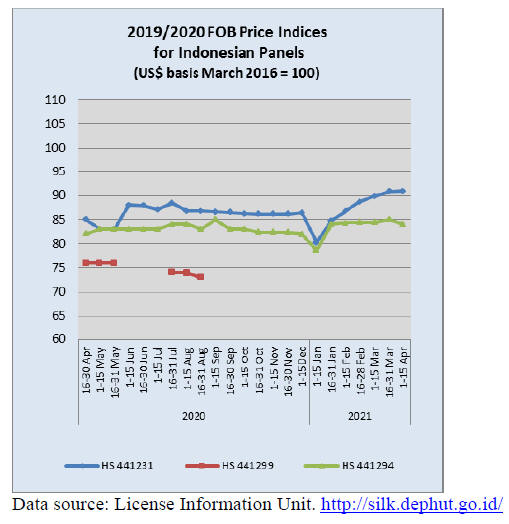
5.
MYANMAR
It has not been possible to
obtain news of the timber
industry.
Urgent action needed to stop violence
The UN Country Team in Myanmar reiterated its call for
an end to violence against civilians. “[We are] following
events in Bago with reports of heavy artillery being used
against civilians and medical treatment being denied to
those injured”, the Country Team (UNCT) said in
a Twitter posting. “The violence must cease immediately”,
it stressed.
See:
https://news.un.org/en/story/2021/04/1089492
Myanmar's military has rejected a request by U.N. special
envoy, Christine Schraner Burgener, to visit the country.
"I regret that Tatmadaw answered me yesterday that they
are not ready to receive me," she says on Twitter, referring
to the Myanmar military.
"I am ready for dialogue. Violence never leads to peaceful
sustainable solutions."
See:
https://asia.nikkei.com/Spotlight/Myanmar-Coup/Myanmarcoup-latest-UN-envoy-remains-ready-to-meet-junta-despiterefusal
Economic collapse
The Myanmar economy averaged 6% growth over the past
10 years but is now projected by the World Bank to shrink
10% in 2021.
Aaditya Mattoo, the World Bank’s chief economist for
Asia has been reported as saying “A 10% contraction in
growth for a poor country seems to me disaster enough
already.” Analysts at Fitch Solutions have projected a
“conservative” 20% contraction for the 2020-21 fiscal
year.
See:
https://www.businessstandard.com/article/international/myanmar-economy-likely-tocontract-up-to-20-as-crisis-looms-analysts-121041300053_1.html
6. INDIA
Strong housing
market in Q1
Compared to the final quarter of 2020 housing sales
increased 12% in the first quarter of 2021 according to a
report by PropTiger.com who noted that measures taken
by the Central and State governments to boost buyer
confidence have been effective.
The report ‘Real Insight - Q1CY21’ says 66,176 homes
were sold in the first quarter of 2021. However, compared
to the first quarter of 2020, home sales in the first quarter
2021 were down 5%.
The Group CEO of PropTiger.com, Dhruv Agarwala,
pointed out that real estate companies have more
confidence as liquidity support is available and buyer
sentiment is recovering.
The Inspector General of Registration in Maharashtrahas
reported a three-fold rise in property registrations in
March. The reduction in stamp duty rates has lifted
sentiment and spurred home buying.
See:
https://www.financialexpress.com/money/home-sales-rise-12-in-jan-march-quarter-amid-stamp-duty-home-loan-rate-cutsreport/2229249/
Good growth prospects – IMF
The IMF has projected a 12.5% growth rate for India in
2021, the only major economy to have a positive growth
rate last year. The annual World Economic Outlook,
prepared for the spring meeting with the World Bank, says
the Indian economy is expected to grow by 6.9% in 2022.
In 2020, India’s economy contracted by 8% according to
the IMF.
India’s exports and imports surged more than 50% from a
year earlier in March but this was from a very low base.
Data from the Ministry of Commerce shows that exports
grew 58% to a record US$34 billion and imports rose 53%
to US$48 billion in a month when global trade was
disrupted by the week long closure of the Suez Canal.
See:
https://indianexpress.com/article/business/economy/imfprojects-indias-growth-rate-to-jump-to-impressive-12-5-per-centin-2021/
New investments in particleboard production
The growing demand for particleboard, driven partly by
increased purchases of ready to assemble furniture, is
attracting investment in production by major companies.
Currently, particleboard production is dominated by small
sized producers but now some of the laminate
manufacturers see an opportunity in panel production.
The Times of India has reported that the Gujarat
Government has approved a proposal from Merino
Laminates to establish a particleboard plant at Halol in
Panchmahal district. Plyreporter has indicated that other
high pressure decorative laminate producers are also
considering moving to downstream panel production.
See:https://timesofindia.indiatimes.com/city/ahmedabad/gujaratgovt-clears-rs-6k-cr-investments/articleshow/81160296.cms
and
http://emagazine.plyreporter.com/ply-reporter-march-2021/
Red sanders seized
Recently two tonnes of red sanders worth Rs.17 crores
(around US$2 million) was siezed just as the timber was
about to depart for Hong Kong via Dubai. Red sanders is
in demand especially in China and Japan but it is available
only in Seshachalam forests of Andhra Pradesh and is an
endangered species.
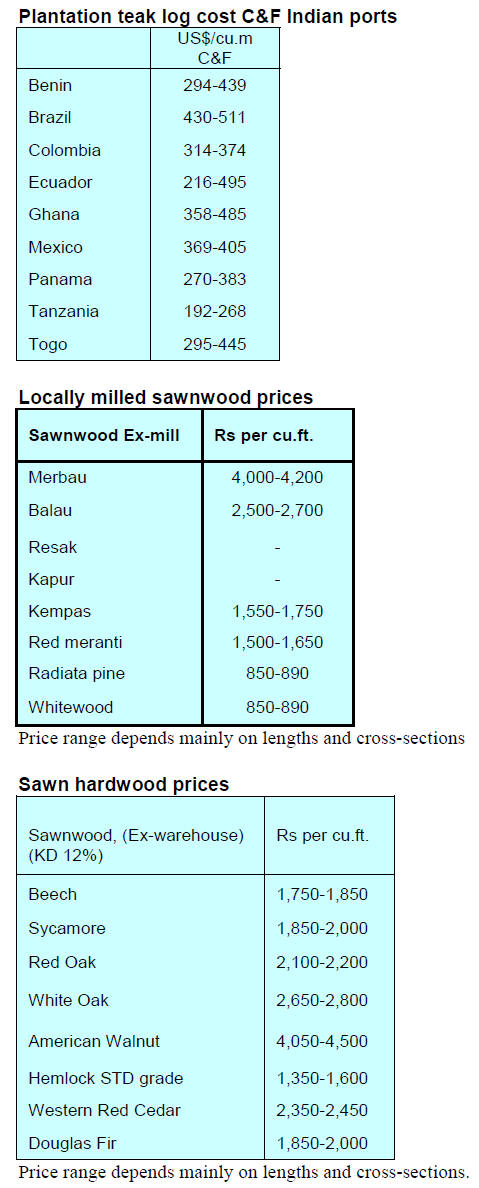
Plywood demand set to expand
According to a report ‘Indian Plywood Market: Industry
Trends, Share, Size, Growth, Opportunity and Forecast
2021-2026‘ from the IMARC Group a market research
company, the Indian plywood market was worth Rs222.5
Billion in 2020 and could expand over 4% annually up to
2026. The Indian plywood market is primarily driven by
construction activity and the home furnishing sector.
Growth in consumer disposable income levels along with
the rising expenditure on home décor will support demand
for wood based panels.
See:
https://www.imarcgroup.com/indian-plywoodmarket/requestsample
Plywood prices
The recently raised prices for plywood have been accepted
by the market and now, after a long wait, manufacturers
can beathe a sigh of relief. The improved prices, while not
raising margins, do help compensate for the higher
production costs due to rising raw material and labour
costs.
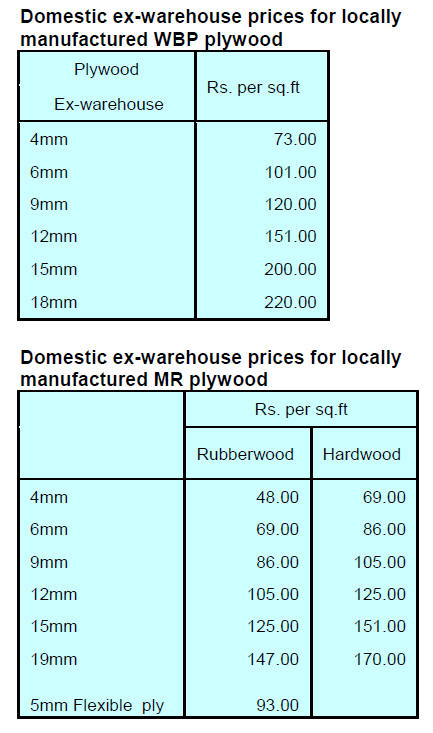
7.
VIETNAM
Phenominal export growth in first
quarter
Wood, forest and wood product export earnings in the first
quarter of 2021 reached US$3.944 billion, an increase of
41% over the same period in 2020 according to the
Vietnam Administration of Forestry.
Of the total, the export revenue from wood and wood
products stood at US$3.699 billion, up 41% while the
export revenue of other forestry products reached US$243
million, up 38% over the same period last year.
High export growth in the first quarter of this year was
achieved in Vietnam’s main export markets such as the
US, Japan, China, the Republic of Korea and the EU
which account for 90% of Vietnam’s forestry export value.
Meanwhile, imports of wood and wood products in the
first three months of this year was estimated at US$696
million, up 31% over the same period last year. The rise
in the value of imports was due mainly to increased prices
for raw materials.
The Ministry of Agriculture and Rural Development
has
asked the forestry sector to implement the “dual goals” of
preventing the COVID-19 pandemic and promoting the
export of products to achieve total export revenue of over
US$14.5 billion for the entirety of 2021.
See:
https://en.nhandan.org.vn/business/item/9754202-exportrevenue-of-forestry-products-soars-41-in-first-quarter.html
China the top investor in Vietnam’s timber industry
According to VNFOREST, over the first 3 months of
2021, there were 10 new wood product plants opened by
foreign investors from 6 countries with a total invested
capital of US$112.51 million. China continued topping
number of new FDI projects in the wood industry sector of
Vietnam.
Out of the 10 new projects, 8 projects were for production
of beds, cupboards and seats.
Investors from China accounted for half of the new
projects at US$13.86 million followed by Hong Kong (1
project for pallet production) Singapore (1 project for
wood/plastic flooring production), Belize (1 project on
indoor/outdoor furniture), South Korea (1 project on
plantation establishment) and the British Virgin Islands (1
project on production of dining tables, seats, beds and
cupboards).
In addition, in the first 3 months of 2021, there were 2
foreign investors which increased invested capital. One
was Chinese which expanded composite flooring
production capacity, the other was from Hong Kong which
upscaled its kitchen and vanity production factory.
See: 3 tháng đầu năm 2021: Trung Quốc vẫn dẫn đầu về số dự án đầu tư vào
Việt Nam trong ngành Gỗ (goviet.org.vn)
Container charges a burden
As of March 2021 the cost container rental for export has
more than doubled creating huge challenge for Vietnam’s
wood industry. Nguyen Liem, CEO of Lam Viet Company
(Binh Duong Province) which is exporting wooden
furniture to EU and US, claims that in the past the
container charge varied between US$2,800– 3,000 but
now it is between US$11,000-13,000.
In 2021, with forecast exports worth around US$14
billion, Vietnam will need 800,000 containers. Many say
part of the reason for this container crisis is the herding of
containers at Chinese ports (up to 50% of global
containers).
See:
https://goviet.org.vn/bai-viet/xuat-nhap-khau-nganh-go-vanoan-vai-vi-cuoc-van-tai-bien-tang-cao-9266
Vietnam’s Forestry development Strategy
On 4 April 2021 the Prime Minister approved the Vietnam
Forestry Development Strategy for the period 2021-2030
with a vision to 2050. The strategy targets that by 2050 the
forestry sector will have become a modern, effective and
highly competitive sector bringing into full play the
potentials and advantages of tropical forest resources with
modern and environmentally friendly technology.
The sector will have created a diversified product range
with high added value and will be a partner in global value
supply chains.
In terms of the contribution to society the forestry sector
will make an important contribution to building a safe and
prosperous country; a green economy will be associated
with forest resources, the traditional cultural identities and
living space of ethnic minorities will be preserved and the
sector will contribute to national defence and security.
On the environment, attention will be paid to sustainable
forest management and long-term conservation of natural
resources and biodiversity; ensuring environmental
security, water source security, minimising land
degradation and negative impacts of natural disasters,
proactively responding to climate change and providing
forest environment services; and participating in an active
and responsible manner and fully implementing the signed
international commitments.
See: Vietnam aims to become world leading forest producttrading centre -
Nhan Dan Online
E-commerce platform to boost trade with EU
The recent launch of a Vietnam/EU e-commerce
platform (VEFTA) is expected to boost Vietnam’s exports
to the EU market. Nguyen Kim Hung, Head of the
Vietnam Institute of Business Administration and Digital
Economy, said the platform will serve as a B2B
marketplace helping connect Vietnamese firms
and international trade partners, especially those from
Europe.
Once completed, it will be directly linked with the existing
e-commerce platforms of cities, provinces and sectors, he
said, noting that the platform will also provide necessary
information about trade agreements and policies regarding
international trade.
See:
https://en.vietnamplus.vn/ecommerce-platform-a-boost-forvietnams-exports-to-eu/199753.vnp
8. BRAZIL
Corona surge to impact economy
A second wave of the corona pandemic is sweeping Brazil
and is likely to impact economic activity in March, April
and even into May says the Central Bank president,
Roberto Campos Neto.
Brazilian Economy Minister, Paulo Guedes, said he
expects the economy will be back on track in two to three
months as the nationwide vaccination programme allows
people back to get back to work.
Forestry sector job creation
According to the Brazilian Agriculture and Livestock
Confederation (CNA) the agricultural sector created
32,986 new jobs in January this year, double the number
created in January 2020.
Among the agricultural activities that contributed
to the
job creation the forest sector created 1,022 new jobs. This
data is in line with private sector analysis which shows
that, although the forest sector was hit by an
unprecedented global crisis in 2020, it remained resilient.
Amazon task force
The ‘Task Force in Defense of the Amazon’ in the
Attorney General's Office will operate for one more year
according to the Brazilian Official Gazette after efforts by
the Brazilian Institute for the Environment and Natural
Resources and the Chico Mendes Institute for Biodiversity
Conservation (ICMBio). The Legal Amazon task force
was established in September 2019 to act on demands for
the defense of public environmental policies.
To date, the task force has collected R$3.11 billion from
environmental violators to guarantee the recovery of
151,700 hectares in the states of Amazonas, Rondônia,
Mato Grosso, Pará, Maranhão and Roraima in the Legal
Amazon. Most of the cases involve logging companies
and people who illegally transported, stored and traded
timber without an environmental license.
Furniture exports grow in February
Brazilian furniture exports continued to rise in February
according to data released by the Brazilian Furniture
Industry Association (ABIMÓVEL) in partnership with
the Brazilian Trade and Investment Promotion Agency.
2021 started well and international sales by the sector in
February 2021 were 27% higher year on year.
Specifically, exports of wooden furniture grew 29% in
February with the United States, the main destination
where demand expanded over 40%. The United States
continues as the main export market for Brazilian
furniture.
Furniture exports to Chile are also growing at a faster
pace, more than doubling compared to February 2020. As
a result Chile was the second placed destinations for
Brazilian furniture exports.
Successful marketing in the Chilean market demonstrates
that new opportunities for the national furniture sector can
be created. Proximity and bilateral agreements between
Brazil and Chile favour business development especially
in light of the disruption to global trade and exchange rate
issues for the Brazilian currency.
Reducing bureaucracy to support entrepreneurs
Provisional Measure (MP) N° 1.040 of March 29, 2021
published by the Federal government seeks to facilitate
foreign trade operations in Brazil.
This complements the Economic Freedom Act (Lei da
Liberdade Econômica) a set of measures to reduce
bureaucracy and make life easier for entrepreneurs which
came into force in September 2019. Flexibility in licensing
processes should facilitate the entry of imported goods
into Brazil.
The objective of the MP is to reduce the cases in which a
license is required. The regulation prohibits Federal
agencies from setting limits on the values of goods or
services traded. The exceptions are the regulations and
procedures for tax or customs under the jurisdiction of the
Special Federal Revenue Secretariat of Brazil and the
Ministry of Economy.
The government also ended the Integrated System of
Foreign Trade Services (Siscoserv). Previously companies
needed to use this system to inform the government of
their operations abroad. Now, the information on such
operations will be passed directly by the Central Bank and
then on to the Ministry of Economy eliminating
duplication.
It has been estimated the latest MP will help the private
sector to save R$3.5 billion per year by reducing
bureaucracy and eliminating barriers to imports.
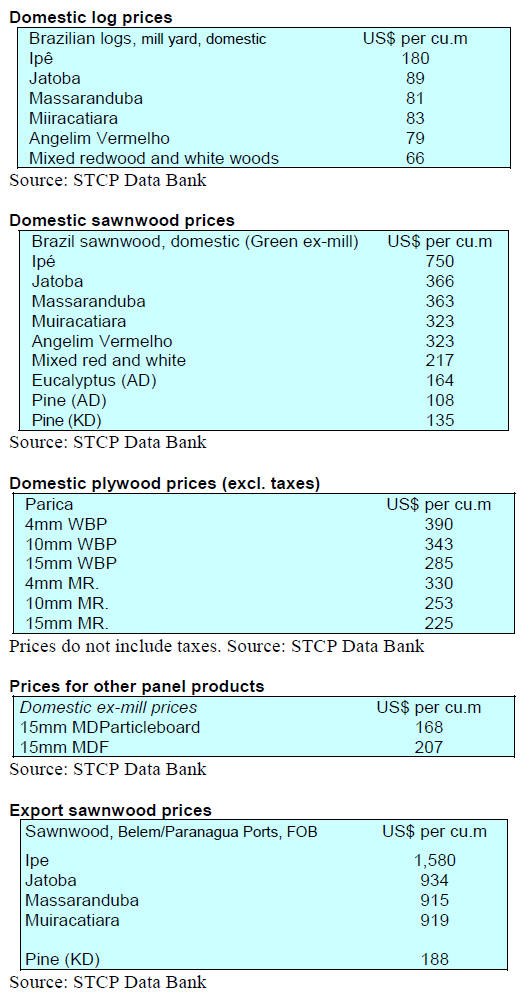
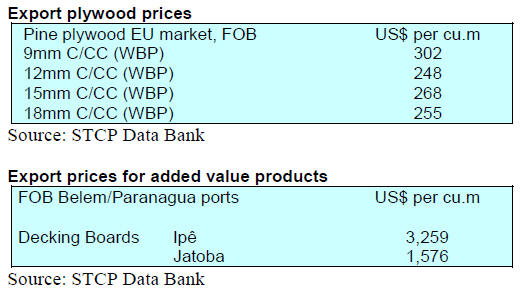
9. PERU
Adex: sustainable forest management
would help
reduce poverty
The president of the Exporters Association (Adex), Erik
Fischer, has said one way to end social exclusion and fight
extreme poverty is to value the Amazonian forests through
sustainable forest management, so that jobs can be
generated. He added that supervised forest concessions are
a tool that can improve productivity and at the same time
allow conservation of resources and generate
economically profitable and environmentally sustainable
jobs”.
He reiterated that most deforestation is a consequence of
the burning of forests for subsistence agriculture and that
after two years the areas are abandoned and new more
fertile areas cleared. He added that there are more than 13
million hectares of communal lands but this resource has
not become a source of development and well-being for
these communities.
A report from the CIEN-Adex Global Business and
Economy Research Center indicated that in 2020 the stock
of direct and indirect jobs generated by the wood product
export sector was 21,959, down 23% from 2019.
January export earnings
In January 2021 timber exports were valued at
US$7,227,000, a decline of 21% compared to the same
month last year. The top five destinations in January were
China (US2.31 million), France (US$1.127 million)
Mexico, the United States and Vietnam.
Businessmen - prioritise sustainable development in
the Amazon
The president of a leading wood product manufacturing
company has pointed out that, in recent years,
deforestation has topped 200,000 hectares per year.
This, he said, brought no benefits and there has been no
reforestation and claimed it was because there is no
coordinated work between regional governments, the
central government, entrepreneurs and international
organisations. To change this he urges the government to
establish priority actions in the Amazon for its sustainable
development promoting three economic sectors: forestry,
aquaculture and ecotourism.
A trans-Amazon train and infrastructure development that
integrates Peru, Brazil and the Pacific would boost
investments in reforestation, forest concessions,
aquaculture, ecotourism, agribusiness and responsible
exploitation of natural resources.
Currently the competitiveness of forestry businesses is
undermined as freight costs to transport wood to the coast
are between US$60 and US$250 per cubic metre. A trans-
Amazon rail line would cut transport costs.
First plantation harvest in 2023
With almost 25,000 hectares of forest plantations in
Ucayali Bosques Amazónicos (BAM) is preparing to serve
the domestic market taking advantage of the Federico
Basadre highway. The company will begin the first harvest
in 2023.
With an estimated investment of US$2 million between
2021 and 2022, the BAM nursery will have a capacity to
produce 1.5 million seedlings per year to supply its
operations in the Ucayali and Madre de Dios regions,
selling the excess to third parties. The main species
planted are Marupa, Capirona, Shihuahuaco and teak.
See:
https://gestion.pe/economia/empresas/moodys-bosquescalificacion-primera-cosecha-de-bosques-amazonicos-sera-en-el-2023-noticia/
